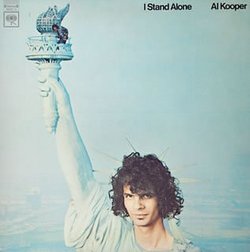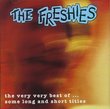| All Artists: Al Kooper Title: I Stand Alone Members Wishing: 4 Total Copies: 0 Label: Sony/Columbia Release Date: 6/9/2003 Album Type: Import Genres: Pop, Rock, Classic Rock Style: Blues Rock Number of Discs: 1 SwapaCD Credits: 1 |
Search - Al Kooper :: I Stand Alone
 | Al Kooper I Stand Alone Genres: Pop, Rock, Classic Rock
Remastered Japanese reissue of the folk-rock singer/songwriter's 1969 album, that's out-of-print domestically, packaged in a miniature LP gatefold sleeve featuring 12 tracks. Sony. 2003. |
Larger Image |
CD DetailsSynopsis
Album Description Remastered Japanese reissue of the folk-rock singer/songwriter's 1969 album, that's out-of-print domestically, packaged in a miniature LP gatefold sleeve featuring 12 tracks. Sony. 2003. Similar CDs
|
CD ReviewsCreative Genius jeff hirshberg | New york | 04/25/2003 (5 out of 5 stars) "This is one very unique album which I was fortunate to be exposed to by an older sister who knew more about artists and music than your average Joe on the street. This is not an album with technical finesse, but more of an experiment with sound; It is comparable to an early picasso, or other artists looking for a sound or image no one has reached for as yet. If no one ever reached for it, then the new boundaries of creativity would never be found.If I were more closely associated with Al Kooper when he produced this album, I would understand what he was trying to do, and why he created it. From a listeners point of view, and my experience in music over the past 50 years, I see an artist playing with his medium; specifically, the use of stereo sound, and an array of sound effects blending one song with another. But most important, is the quality of song writing from this true pioneer of rock and roll. One song after another shows his true genius. "I can love a woman," "Toe Hold," "Blue Moon of Kentucky," "One," "Camile," and "Western Union Man" all show a style quite different from his contemporaries. It is ironic that he probably did not think much of this album, but in producing it, created something totally unique and relatively successful from an artistic point of view. Al Kooper is one artist few listeners recognize, but like other innovators, he is well respected by his peers for his influence and creativity in music. Where would music be without such innovators?" Over 30 years and it's still good podavis | Michigan | 09/25/2004 (5 out of 5 stars) "I first bought this album at ShopRight around 1970. About a 15 years ago I found another copy that was in somewhat better condition then the first by then beat-up copy. Last year, after a careful washing and a high pressure blow dry I converted the second copy to a .wav file and cleaned up the pops and ticks with Pyro. When it comes to the top of my stack of digitized vinyl there is no hesitation to pick it again. I will never get tired of this record. It's not amazing, or over-whelming, or soul stirring. What makes it great is that it's mostly just plain fun to listen to." Not quite a classic, but close Gordon Pfannenstiel | Russell, KS United States | 05/14/2007 (4 out of 5 stars) "Hmmm...only one review of this album, and One is the lonliest number that you'll ever do...so now there's two.
Forgotten is the appropiate word for this, Al Kooper's first solo album. But it is certainly NOT appropriate that it's a forgotten album. It ranks as a milestone of 1968-69, and actually of milestone of the 60s, period. IMO, it isn't quite as strong as Child Is Father To The Man, either in terms of composition or production, but it's close. The sound collages that pervade the album are either nuisances or profound artistic touches, depending on your point of view. Personally I find some of them the former and some the latter. As usual, Kooper is a master interperator of outside material, offering great versions of One (Harry Nilsson), Coloured Rain (Traffic),Toe Hold (Stax;Porter and Hayes) and Western Union Man (Jerry Butler; Gamble and Huff). Again, IMO, he stumbles with Blue Moon Of Kentucky. Don't get me wrong, it's an inspired choice, but Kooper missteps on the production. Evidently he's trying to do his interpretation of the Sun echo, but he gets carried away, and the song is drenched past the point of saturation. Kooper also comes up with some great originals: the 6/8 ride of I Stand Alone, the gentle lilt of I Can Love A Woman, the hazy psychedelics of Right Now For You and the Beatlesque Song And Dance For The Unborn, Frightened Child. And while Camille is not quite at the same level compositionally, it does offer a superb arrangement and production. However, Al again takes one serious misstep with Soft Landing On The Moon. I know this was 1968, but this is merely 4 minutes of padding. Period. Up until recently, I've been confined to enjoying an old LP version of this album. I just received this Japanese import, and I'm listening to it as I write this. Though the sound doesn't compare to my recent 24 bit remaster of New York City (You're A Woman), it's nice to hear it without the clicks and pops. If think you you've "heard it all" and haven't listened to Al Kooper, you're fooling yourself. " |

 Track Listings (12) - Disc #1
Track Listings (12) - Disc #1



